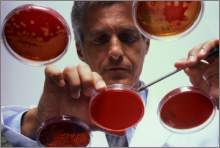How Bisphosphonates Can Wipe Out "Superbugs"
(Drug-Resistant Bacteria)
by www.SixWise.com
In the last 10 years, most bacteria have become increasingly resistant to treatment with antibiotics. These drug-resistant "superbugs" are the result of years of overzealous use of the drugs -- in food (livestock) and also in humans (for medicine).
|

Bisphosphonates keep superbugs from sharing their DNA.
|
As a result, there's a good chance that if you get sick, good old penicillin may not make the grade.
Last year, you may remember, methicillin-resistant Staphylococcus aureus (MRSA), once an obscure illness confined to a spattering of hospital intensive-care units, broke out among schools across the United States, as well as in the general population. And that is just one type of drug-resistant bacteria that's out there.
Researchers are scrambling, needless to say, trying to figure out how to keep these hearty bacteria in check -- and from becoming an even greater threat to public health. And now they may have found an answer.
Bone Drugs to the Rescue?
In what MSN called one of the top medical breakthroughs of 2007, researchers at the University of North Carolina at Chapel Hill made an interesting discovery about bisphosphonates -- the compounds found in many bone-building drugs.
The compounds not only prevent superbugs from sharing their DNA, they also kill cells that harbor DNA from drug-resistant bacteria. This could theoretically wipe out the threat of superbugs in the future.
|
PerfectClean Cloths: Don't Leave Home Without Them
 The PerfectClean line of cloths, dusters and mits are what the hospitals, schools, fine hotels and other leading organizations are now using to safely keep their facilities "microscopically clean," and you and your family don't deserve any less. The PerfectClean line of cloths, dusters and mits are what the hospitals, schools, fine hotels and other leading organizations are now using to safely keep their facilities "microscopically clean," and you and your family don't deserve any less.
The cloths are made with a revolutionary ultramicrofiber construction that enables them to reach deep into microscopic crevices (NO other cleaning tool available even comes close!) to actually remove dirt and bacteria -- including superbugs -- not just push it around like ordinary cleaning rags.
Plus, these cloths are small enough to slip into your pocket, purse, or desk drawer, and you can use them without any cleaning products or water. Simply pull out the cloth, wipe down any number of surfaces (including your hands!), and enjoy the peace of mind in knowing your home and office are truly clean.
Find out More and Order PerfectClean Cloths, Dusters and Mits Now!
|
"Our discoveries may lead to the ability to selectively kill antibiotic-resistant bacteria in patients, and to halt the spread of resistance in clinical settings," said Matt Redinbo, Ph.D., senior study author and professor of chemistry, biochemistry and biophysics at UNC-Chapel Hill.
Animal studies involving the drugs are now underway, although there are reports that some doctors are already prescribing bisphosphonate drugs off-label to help fight infections.
The researchers believe that ultimately the drugs may be most effective when doctors can control dosage, such as on the skin and in the gastrointestinal tract. Disinfectants and sprays for farm animals may also be future possibilities.
Trading One Danger for Another?
While the potential to kill deadly superbugs is a great find, bisphosphonate drugs are not without their faults.
Most notably the drugs, which are marketed under the names Fosamax, Actonel, Didronel, Boniva and others, have been linked to a serious side effect called osteonecrosis, in which areas of bone in your jaw die.
It's estimated that between 1 percent and 10 percent of patients on bisphosphonates develop the condition.
The FDA also released an alert earlier this year warning of the risk of severe and sometimes incapacitating bone, joint and muscle pain among people taking the drugs.
|

Some doctors are already prescribing bisphosphonates off-label to fight infections -- but the drugs may carry steep risks.
|
"The severe musculoskeletal pain may occur within days, months, or years after starting a bisphosphonate. Some patients have reported complete relief of symptoms after discontinuing the bisphosphonate, whereas others have reported slow or incomplete resolution. The risk factors for and incidence of severe musculoskeletal pain associated with bisphosphonates are unknown," notes the FDA.
Other potential side effects include stomach irritation, diarrhea, constipation, dizziness, headache, swelling of the feet and legs, vomiting, nasal congestion, difficulty sleeping and more.
Still, the researchers remained hopeful.
"We hope this discovery will help existing antibiotics or offer a new treatment for antibiotic-resistant bacteria," Redinbo said.
Recommended Reading
6 Types of Very Common Toxic Bacteria You Need to Avoid, and Where They're Typically Found
Norovirus: The Symptoms and Prevention of This All-Too-Popular "Stomach Flu Virus"
Sources
Proceedings of the National Academy of Sciences July 13, 2007
Science Daily July 12, 2007
FDA: Center for Drug Evaluation and Research
MSN.com